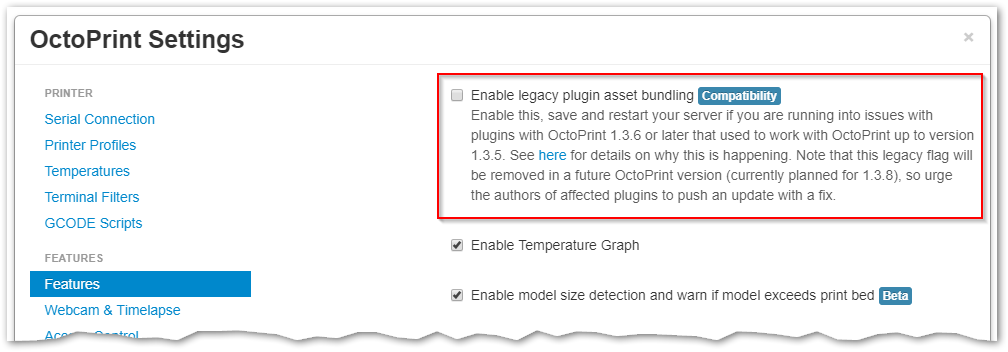Heads-up plugin authors! Potentially breaking change with 1.3.6
A change to solve issues with plugins bundling JS assets that cause interference with other plugins (e.g. through
the declaration of "use strict") and in general to add better isolation and error handling might cause errors
for some plugins that go beyond your run-off-the-mill view model and also implicitly declare new globals.
This post will tell you what will change, what plugins are even affected and how to quickly fix the possible issues with a simple plugin update.
What will change?
OctoPrint by default will no longer bundle the JS assets provided by plugins just one after the other like this:
/* contents of plugin_a_1.js */
;
/* contents of plugin_a_2.js */
;
/* contents of plugin_b.js */
;
/* and so on */
Instead it will wrap each plugin’s assets into its own IIFE (immediately invoked function expression) and try-catch-block to isolate it better and thus reduce potential issues like unexpectedly enabled strict mode or other such hard to debug issues:
(function() {
try {
// source: plugin/a/plugin_a_1.js
/* contents of plugin_a_1.js */
;
// source: plugin/a/plugin_a_2.js
/* contents of plugin_a_2.js */
;
} catch (error) {
log.error("Error in JS assets for plugin a:", (error.stack || error));
}
})();
(function() {
try {
// source: plugin/b/plugin_b.js
/* contents of plugin_b.js */
;
} catch (error) {
log.error("Error in JS assets for plugin b:", (error.stack || error));
}
})();
/* and so on */
The way scoping in JavaScript works, this means that any functions or variables that you declare in your JS file
without a scope limiting keyword like e.g. var will no longer just be pushed to the global namespace but instead
only be declared locally inside the IIFE. That means they won’t be accessible globally either unless you explicitly
attach them to window yourself. This is not a problem (especially not if you did it accidentally) unless you try
to use those identifiers outside of your JS files, e.g. in a template your plugin also provides.
What plugins are affected?
Only AssetPlugin plugins whose JavaScript files contain implicit global declarations of functions or variables
they then try to access outside of their JavaScript files are affected.
Let’s look at an example. If you have something like this myHelper function in your plugin’s JS asset:
$(function() {
function YourViewModel(parameters) {
var self = this;
self.value = ko.observable("value");
}
OCTOPRINT_VIEWMODELS.push({
construct: YourViewModel,
dependencies: [],
elements: ["#mySpan"]
});
});
function myHelper(value) {
return "formattedValue: " + value;
}
and then use it in your plugin’s template:
<span id="mySpan" data-bind="text: myHelper(value)"></span>
then your plugin will run into an error with OctoPrint 1.3.6 since your myHelper will no longer be automatically
available on the global namespace and an error will be thrown when your view model is bound to your template.
If you just accidentally forgot to make your myHelper function local and are only using it inside your own JS
assets however there won’t be any problems.
How do I solve this?
The quick and dirty solution
Instead of implicitly declaring your global function or variable that you need outside of your JS assets,
do it explicitly by setting it on window:
$(function() {
function YourViewModel(parameters) {
var self = this;
self.value = ko.observable("value");
}
OCTOPRINT_VIEWMODELS.push({
construct: YourViewModel,
dependencies: [],
elements: ["#mySpan"]
});
});
window.myHelper = function(value) {
return "formattedValue: " + value;
}
That’s fully backwards compatible to earlier versions of OctoPrint too - you are really just doing something explicitly that before you were doing implicitly.
A possibly cleaner solution
But even better yet is to avoid global functions in general and instead see if you can’t adjust your plugin
to instead bind to a helper function or even a computed/pureComputed defined on your view model if it’s bound to
the template in question anyhow:
$(function() {
function YourViewModel(parameters) {
var self = this;
self.value = ko.observable("value");
self.formattedValue = ko.pureComputed(function() {
return "formattedValue: " + self.value();
});
/* OR MAYBE */
self.myHelper = function(value) {
return "formattedValue: " + value;
}
}
OCTOPRINT_VIEWMODELS.push({
construct: YourViewModel,
dependencies: [],
elements: ["#mySpan"]
});
});
<span id="#mySpan" data-bind="text: formattedValue"></span>
<!-- OR MAYBE -->
<span id="#mySpan" data-bind="text: myHelper(value)"></span>
And then?
In any case, if your plugin is affected, just push an update of your plugin with this change in place and once your users update your plugin all should be fine again.
What can my users do until I’ve updated my plugin?
Since it’s only logical that not all affected plugins will already be adjusted at public release of OctoPrint 1.3.6, I’ve added a small feature toggle that allows to force the old bundling approach if set:
To make plugins that broke due to the change work again, simply checking “Settings > Features > Enable legacy plugin asset bundling”, saving and restarting the server will have OctoPrint use the old method of asset bundling again and work around the problem (with the downside of having the same potential compatibility issues with other plugins again that made it necessary to introduce this change in the first place).
Please note however that this flag will only be available for a limited period of time. I currently plan to remove it again in OctoPrint 1.3.8. This should leave you enough time to do the minimal adjustment necessary in your plugin.
Why was this introduced now?
Some users and plugin authors started running into seriously hard to debug problems caused by other plugins declaring strict mode or otherwise interfering. That’s something that in all likelihood would have gotten only more worse the longer a stricter isolation of plugins wasn’t in place.
Considering that the change needed to get affected plugins going again is a very simple on, not many plugins should even be affected and a better isolation and error handling has huge benefits, I decided that the advantages here certainly outweigh the disadvantages.
If you want even more details, feel free to read the related ticket that led to the introduction of this change.
- Published
- 01 Dec 2017
- Category
- Development
 OctoPrint.org
OctoPrint.org
